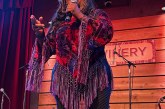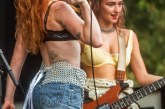The concert industry scrambles to reinvent itself during COVID-19
It was late January when Shawn Beaulieu, the lighting designer and director for the Knoxville-based True Grip & Lighting – maybe around the time the first confirmed case was reported in the United States – realized that a storm was coming in the form of a virus called COVID-19.
Even though cases were, at that time, limited primarily to China, it seemed to be spreading, Beaulieu noticed, and it seemed to be disrupting all facets of life, as well. It was enough of a concern, in fact, that he mentioned it to John “Corky” Corcoran, the owner and founder of True Grip who, after graduating from Fulton High School in 1981, worked in television for 20 years before starting his own company. Today – when there’s not a pandemic raging, at least – True Grip has a number of different irons in the fire, from concerts in and around Knoxville to collaborations with NASCAR, ESPN, the Super Bowl and numerous other services designed for the film, television and music industries.
COVID-19, Beaulieu told Corcoran, might cause a lot of problems.
“That was at the end of January. By mid-March, we ended up wiping our calendar within two days,” Beaulieu says. “We had a pretty full calendar with a handful of stuff going on every month through the end of the year. But then things started going into lockdown around the country, and we had 50-plus events canceled in those two days.”
Around the same time, on-fire-right-now roots rock guitarist Marcus King was trying to get back to the United States. The Marcus King Band (which will perform Sept. 12 at Smokies Stadium in Kodak – a show that will be one of the first live music events since the pandemic began) had just wrapped up a European tour with a March 9 date in Copenhagen. At first, King says, he and the boys were content to sit in the airport bar and avail themselves of the region’s craft beers on tap.
“We started getting more and more concerned that we weren’t going to be able to get back to the States – which would not have been the worst fate because we were having such a good time in Denmark,” King says. “But we wanted to get home to our families. They let us back in [the country] with no problems, but Customs at JFK [International Airport] gave me a hard time when they found out we were coming from Amsterdam.
“But then I went and played at Love Rocks [a March 12 benefit concert at the Beacon Theatre in New York that at the last minute became a livestreaming performance without an audience because of COVID-19]. And even though they didn’t let anybody in, retrospectively, it ended up being a petri dish. Everybody that was there got that [expletive] virus. My parents got it, even though they’re fully recovered and doing great now. But that’s when it first dawned on me that this was going to be pretty serious.”
It did, and it remains so, with 6 million people in the United States infected and 180,000 deaths resulting from the virus. For the concert industry, it’s been nothing short of economic Armageddon: In April, The Los Angeles Times estimated that losses could amount to $9 billion … and that was when the industry hoped that summer might bring relief.
“In the early stages, we were hoping that this would last until maybe July because that’s what everybody was saying in the news,” Beaulieu says. “Then it became evident that things were going to continue to cancel, especially as information was changing daily and as policies around the country changed daily. Some of the events I was talking to up until a few weeks ago got canceled, and now the feedback I’m hearing is that nobody’s going to go [to events] until they’re comfortable there’s a vaccine or it’s 100 percent safe.
“And that affects over 12 million event employees in this country. I don’t think people realize how much this industry affects the economy and how those people aren’t going to have jobs for a long time. I’m seeing people that I’ve known who have been in the business forever just give up and try to move on to something else. Smaller companies, larger companies – a lot of them aren’t going to make it if this continues.”
True Grip, he adds, has weathered the storm relatively well, all things considered. The company works in entertainment and special events lighting for concerts and corporate events, which Beaulieu oversees, and television/grip lighting, and a lot of that work is carried out in conjunction with ESPN. Besides lighting, True Grip provides golf carts for NASCAR, and that was a boon when racing resumed last May.
“That helped a little bit, because we’ve got two tractor trailers that go to every race, but as for the rest of the business, there really hasn’t been any,” he says. “All of our television stuff was canceled. All of our entertainment events have canceled. Luckily, we’ve been in good financial standing, and that’s been our saving grace.”
In the down time, Beaulieu adds, he and his fellow employees have been able to tackle evergreen projects that are always pushed to the back burner in busier times: equipment repair, shop work and other things that fall by the wayside in light of a full workload. Along the same lines, King and his crew have also taken advantage of the break.
“On one side, we’re all kind of thankful that we can take our foot off the gas and coast for a minute, to be with our families and focus on our physical and mental health and just take a breather, which is good for you,” he says. “I have time to work on my house, time to do whatever. But it’s also kind of a cruel joke played on a lot of musicians because we don’t have the resources coming in anymore. In a lot of ways, it’s torn this industry apart.”
Which is why, when a group of East Tennessee-based entertainment movers and shakers – including sound engineers Steve Corrigan and “Big” Al Braden, Barley’s Talent Buyer Kyle Przybyszewski, BLANK Publisher Rusty Odom and BigWheel event specialist Aaron Snukals, among others – conceived of a safe, socially distanced drive-in concert series at Smokies Stadium, they found a willing partner in True Grip and a willing performer in King, who had already proposed something similar to his own team.
“We were excited about giving it a shot and trying to partner up with them as much as we can,” Beaulieu says. “If nothing else, it gave us a show to do, and it’s always great to still be able to do a show and have some kind of a crowd. And kind of being one of the first [venues] in the country to pull one off, that was kind of fun.”
The drive-in concert series began in June, but only two shows were held before spiking COVID-19 numbers resulted in a halt until Labor Day weekend. In the nearly three months of downtime, Snuckles and BigWheel owner Parker Frost have put more work into parking – limited to a certain number of vehicles to maintain safe social distance between cars – and other sanitation protocols. Backstage, the True Grip folks will be masked up and using more hand sanitizer. If all goes well, the format may well set the tone for concerts to come – at least until COVID subsides or a vaccine is introduced.
“If everybody follows the rules in place, then it’s a safe environment and an opportunity to have a great time,” Beaulieu says. “On top of that, the ticket prices per vehicle versus how many people are in your car, it’s hard to find a concert ticket that’s priced that way.”
Mask protocols are encouraged for all concertgoers “when you are not in your space or your car,” according to the series website. For King, that’s a small price to pay in order to get to enjoy live music again. In fact, he adds, if wearing one whenever he’s in public will help him and others in the industry get back to work quicker, he’s all for it.
“If the largest liberty that’s being taken from us is that we have to put a mask across our face, I can do that,” King says. “If I have to go to the grocery store, I don’t want to see anyone anyway. I want to get my food and get out. Nobody’s that good-looking that they can’t cover their face for a few minutes.
“Honestly, if somebody’s trying to take your liberties in other ways, I understand the fuss, but this seems a little trite. I play music, and until people follow these guidelines and the numbers go down or whatever the case may be, I can’t do that. I just think it’s funny because, to me, it’s not a big deal.”
But to those in the music industry, it can make all the difference – especially given that the economic impact still is being felt.
“It seems like the talk about it has died, especially in the mainstream news where everyone is focusing on election stuff, and I think some people are forgetting that we’re still in a pandemic,” Beaulieu says. “You can go out and wear a mask and everything still seems normal, but it’s still affecting millions of people and keeping millions of people out of work.
“I’ve been doing this for over 20 years, and it would be very hard to go out and find another job that would allow me to still be able to pay the bills. This is not just a job; it’s a way of life for so many of us, and if there’s a good chance it does help, why not wear a mask? The more people who do that, the more it’ll help other people get back to work.”








